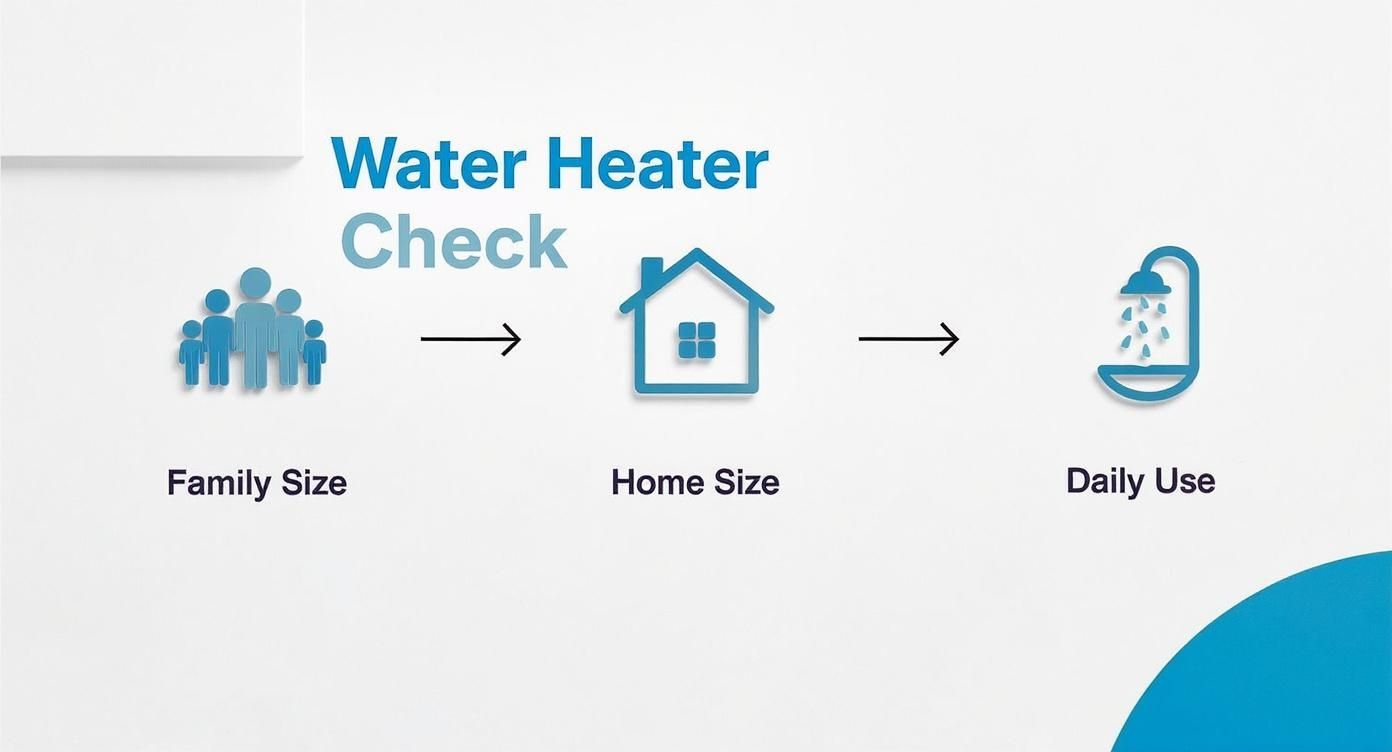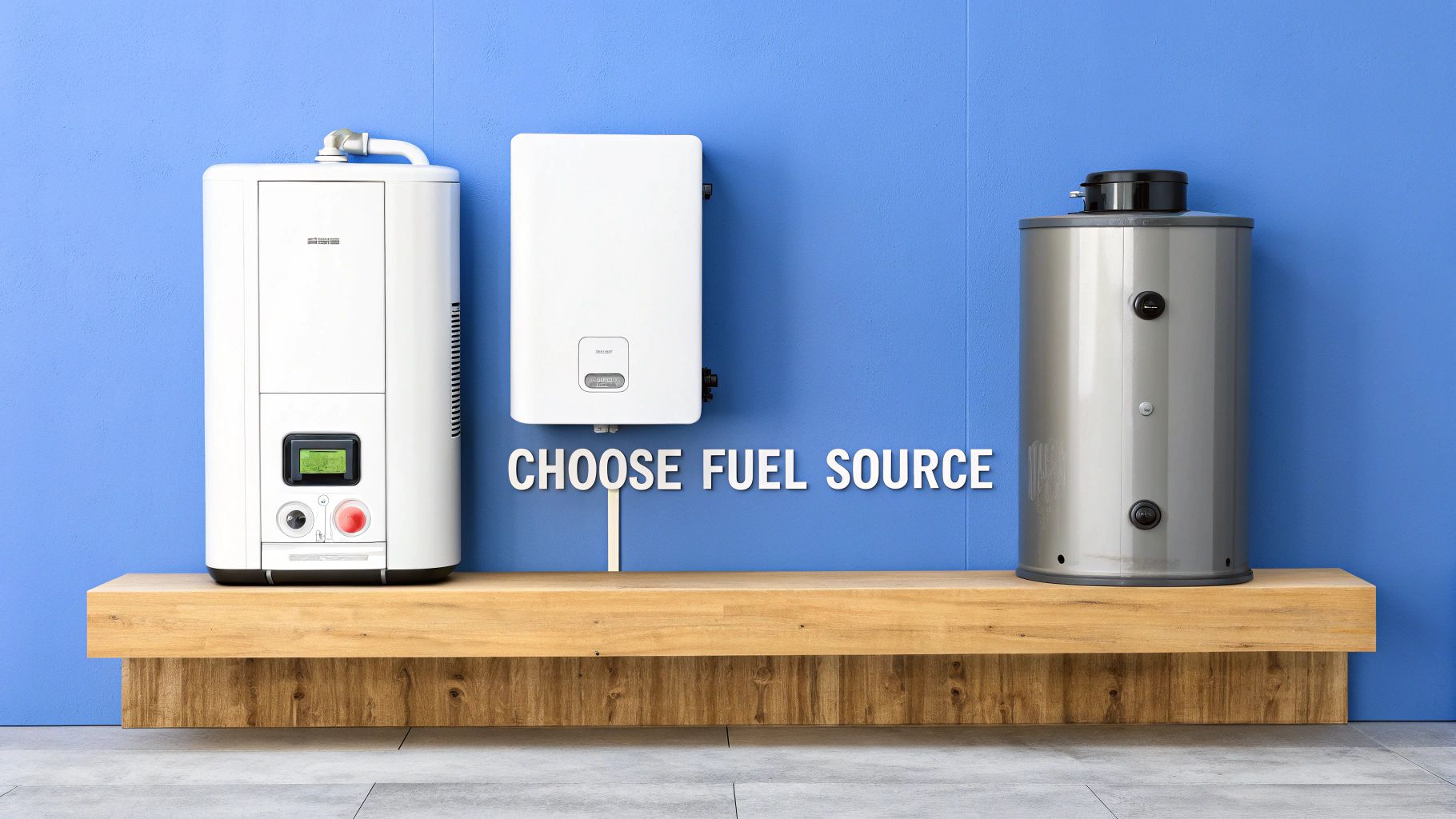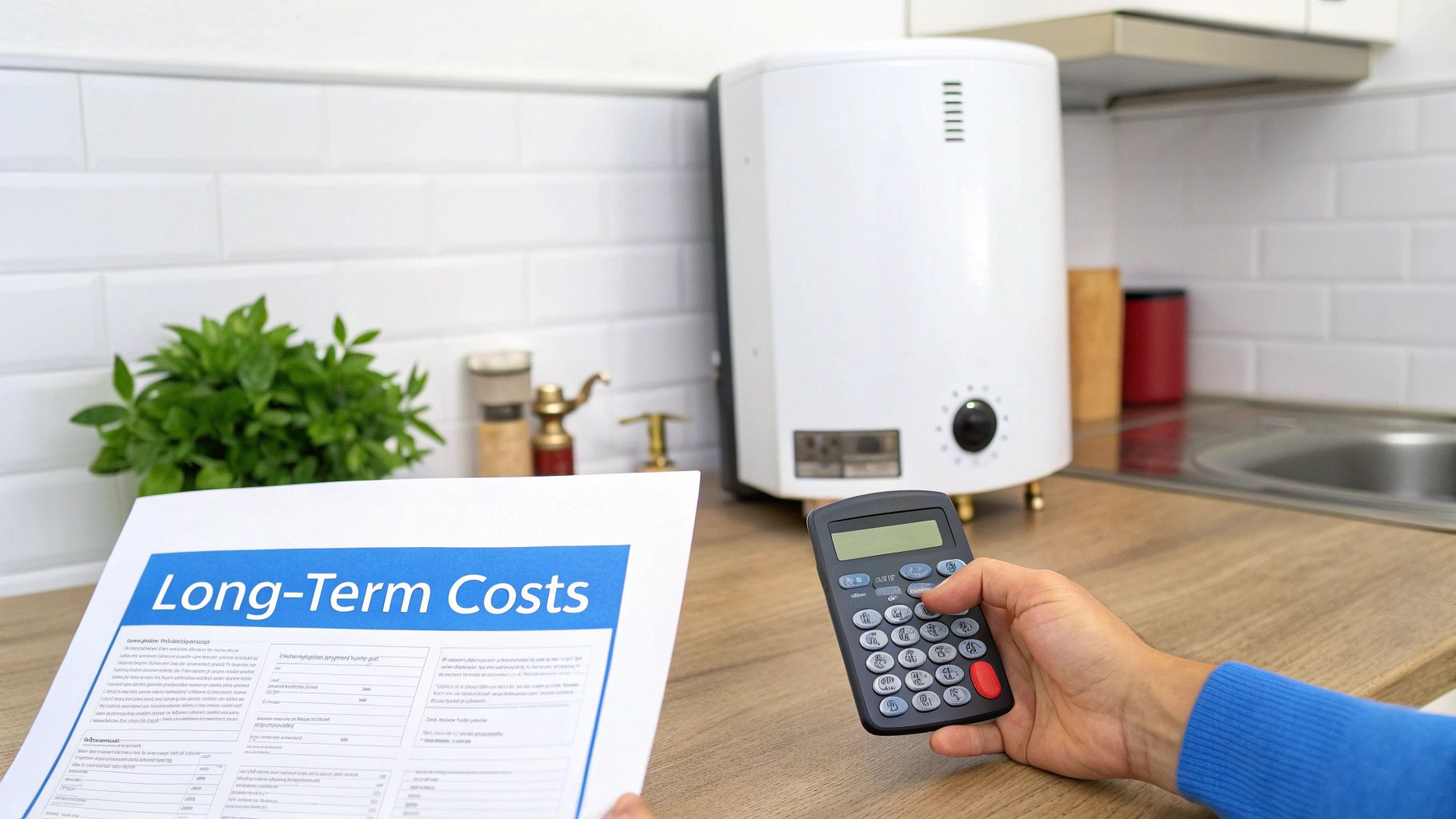How to Choose a Water Heater: A Practical Home Guide
- Justin McCurdy

- Oct 24, 2025
- 9 min read
Picking the right water heater isn't just about grabbing one off the shelf. It's about matching the unit's capacity and fuel type to your family's daily life—and your budget. Think of it as a perfect fit for your home, your habits, and your priorities.
Figure Out Your Real Hot Water Needs
First things first: get a clear picture of your household’s hot water habits. A family of four in White Marsh might have the dishwasher running, a load of laundry going, and someone hopping in the shower all at once. On the other hand, a couple living in Edgewood or Prince George's County probably has much lower, more spread-out usage.
The key is to pinpoint your peak usage. What’s the busiest hour for hot water in your home? Usually, it’s the morning rush. Jot down which appliances and fixtures are often running simultaneously—showers, faucets, the dishwasher, the washing machine. Getting this snapshot will save you from surprise icy showers later.
Here are a few things to consider:
Family Size: How many people are using hot water daily?
Peak Hour Demand: What’s the maximum amount of hot water you use in the busiest hour?
Installation Space: Where will it go? A tight closet and an open garage offer very different options.
Fuel Source: Are you set up for gas, or is electric your only choice? Maybe a hybrid?
Nailing Down Your Peak Hour Demand
Peak hour demand is the magic number. It tells you how many gallons of hot water your family goes through during that single busiest hour of the day.
Let’s do some quick back-of-the-napkin math. A standard showerhead uses about 2.5 gallons per minute (GPM). If two people take showers back-to-back while the dishwasher (around 1 GPM) is running, you can see how the numbers add up fast. This simple calculation helps you find a heater with the right First Hour Rating (FHR) to keep up.
Getting your peak hour demand right is the single best way to avoid running out of hot water and prevent overspending on a unit that's too big.
Don't forget about the physical space. Every home in Baltimore County or Harford County is different. Before you start shopping, grab a tape measure and note your exact dimensions. There's nothing worse than buying the perfect unit only to find it won't fit through the closet door!
Energy efficiency is a huge driver right now. The global water heater market is projected to grow from USD 30.74 billion to USD 45.62 billion by 2032, driven by homeowners looking for greener, more cost-effective options. Learn more about global water heater market growth.
Quick Guide to Common Water Heater Types
Heater Type | How It Works | Best For | Typical Lifespan |
|---|---|---|---|
Storage Tank | Heats and holds a reservoir of water 24/7. | Larger families with high, simultaneous demand. | 10–15 yrs |
Tankless | Heats water instantly as you need it. | Smaller homes, energy savings, and endless hot water. | 20+ yrs |
Heat Pump | Pulls heat from surrounding air to warm the water. | High-efficiency homes where saving on electricity is key. | 8–12 yrs |
Solar Thermal | Uses solar collectors on your roof to heat water. | Eco-conscious homeowners with good sun exposure. | 15–20 yrs |
This chart should help narrow down your choices before diving into technical specs.
For instance, if you have a smaller home in White Marsh or Baltimore County with limited closet space, a compact tankless unit is often ideal. Conversely, a larger Harford County home with multiple bathrooms might require a traditional storage tank with a high FHR to keep everyone happy. All of our homes are large and have many bathrooms standard, which is why we use high efficient water heaters with a storage tank.
Here at Customize Your Home, we help folks in Edgewood, Prince George's County, and all across Maryland figure this stuff out every day. We offer unique customization tools, hands-on service, and access to visualizers so you can select everything from the perfect water heater model to your cabinetry, flooring, and tile choices. Let us guide you to the perfect water heater and help you customize all your home's essential systems.
Ready to make sure the hot water never runs out unexpectedly? Let's find the right model for your routine. Contact our team to get started.
The Great Debate: Tank vs. Tankless Heaters
Every morning is a test: can your water heater keep up with back-to-back showers, the dishwasher, and a load of laundry? That’s why choosing between a time-tested storage tank or a sleek tankless model matters.
A traditional storage tank heater does exactly what it says—it stores 40 to 80 gallons of hot water in an insulated tank. It shines when a busy family tosses in multiple loads at once. We find that a 50 gallon water storage works well with our homes still provides more energy efficiency than larger storage tank water heaters.
Handles high, simultaneous demand with no drop in temperature
Ideal for households in Baltimore County juggling morning routines
Drawback: standby heat loss can bump up your energy bills
The On-Demand Alternative: Tankless Heaters
If you crave endless hot water without waiting, tankless systems fire up burners the moment you turn on the tap. No stored reserve—just hot water on your schedule.
Up to 24–34% more energy-efficient than storage tanks
Compact design frees up basement or utility space
Higher upfront cost and limited by the unit’s GPM rating
For more efficiency ideas, check out our guide on 10 essential home energy efficiency tips for 2025.

Quick Tip: For a family of five in Harford County, a 50-gallon tank heater often covers morning rushes.
Picking between tank and tankless is about fitting your home to your lifestyle. In neighborhoods like White Marsh, we use visualizer tools and hands-on service so you can choose every detail—from countertops and flooring to the systems hidden behind the walls—ensuring your new home really reflects you.
Gas, Electric, or Green Tech? Picking Your Water Heater’s Fuel

The fuel your water heater uses dictates your monthly bills and environmental footprint. The best choice often boils down to what’s already available at your house and how you want to balance upfront costs versus long-term savings.
For many Maryland homeowners—from Baltimore County to Prince George's County—natural gas is the go-to. Gas heaters heat water faster, and natural gas rates are usually lower than electricity. The only catch? You need a gas line connection.
On the flip side, electric water heaters offer installation flexibility—no venting or gas hookup required. Their purchase price is often friendlier, but higher operating costs depend on local electricity rates.
The Rise of Green Technology
The gas vs. electric debate is evolving. A wave of eco-friendly tech is here to save you money and reduce your carbon footprint:
Heat Pump (Hybrid) Heaters: These pull warmth from the air to heat water, making them up to three times more efficient than standard electric models.
Solar Thermal Heaters: Roof-mounted collectors capture the sun’s energy—free energy! While the initial investment is higher, your energy bills can drop significantly over time.
Choosing green options is a solid step toward a more sustainable home. Learn more about sustainable construction practices for greener homes.
The global water heater market was valued at around USD 31.8 billion and is projected to hit nearly USD 49.9 billion by 2035, driven by smarter, eco-conscious choices. Discover more insights about the water heater market.
Fuel Type Cost and Efficiency Breakdown
Fuel Type | Upfront Cost Estimate | Annual Operating Cost | Key Benefit |
|---|---|---|---|
Natural Gas | $400 – $2,000 | $250 – $400 | Low operating cost, fast heating |
Electric | $300 – $1,500 | $450 – $600 | Low initial cost, easy installation |
Heat Pump | $1,200 – $3,000 | $150 – $250 | Extremely high efficiency, big savings |
Solar Thermal | $3,000 – $7,000+ | $50 – $150 | Uses free energy from the sun |
Choosing a fuel source isn't just a technical decision; it's a lifestyle choice that affects your budget, comfort, and your home's environmental impact.
When I help clients in White Marsh or Edgewood customize their homes, we dive into these details using visualizer tools—planning everything from stylish finishes to hardworking systems.
Looking Beyond the Price Tag at Long-Term Costs

It’s tempting to fixate on the sticker price when shopping for a water heater. But that initial cost is just the down payment. The real expense comes from the energy it consumes over the next 10–15 years.
Think of it like buying a car. A cheap model might look good on paper, but if it's a gas-guzzler, you'll feel it at the pump every week. A slightly pricier, fuel-efficient car pays for itself in savings. Water heaters work the same way.
And don’t forget installation. Factor in the initial hot water system installation costs so you have a clear picture of your total investment.
Decoding the Efficiency Label
Look for the yellow Energy Guide label and find the Uniform Energy Factor (UEF) rating. This one number tells you how well the unit turns energy into hot water.
A higher UEF rating means lower energy bills. The more efficient the unit, the less it costs to run each month.
Real-World Example: You’re comparing two 50-gallon electric tanks.
Model A: $500, UEF 0.90
Model B (Hybrid Heat Pump): $700, UEF 2.75
That extra $200 for Model B might make you pause. But with $300+ annual savings, Model B pays for itself in under a year and keeps saving you money every year after.
Calculating Your Return on Investment
Divide the extra upfront cost by your estimated annual energy savings. That tells you exactly how many years it takes for the unit to pay for itself.
Example: If you pay an extra $200 upfront and save $300 a year, you’ll recoup your investment in just 8 months—then enjoy savings for the rest of the heater’s life.
Personalize Your Home Beyond the Basics
housing the right systems—like your new water heater—is a key way to make a house feel uniquely yours. It's a decision that impacts daily comfort and your budget for years.
The new construction homes in White Marsh, Edgewood, Baltimore County, Harford County, and Prince George's County are built to high standards by our builder partner. My role is to go beyond the standard and add a personal touch. I believe buying a home means creating a space that’s a perfect fit from day one.
Customization at Your Fingertips
I give my clients hands-on service and powerful visualizer tools so you can see exactly how all your choices come together. Tweak everything—from systems hidden in the walls to the finishes you see every day.
You can play around with:
Kitchen Finishes: Preview quartz countertops with shaker cabinets.
Flooring and Tile: Mix and match styles in bathrooms and living spaces.
Cabinet Hardware and Kitchen Faucet and Lighting Package: Try my proprietary visualizer to see what the brushed gold package will look like in your new kitchen.
This process empowers you to feel confident about every decision. For more on integrating tech, explore our guide to home smart tech in a new build.
A home is a collection of personal choices. The systems humming behind the walls matter just as much as the surfaces you live on.
My approach ensures you’re an active partner in customizing your new home. If you're ready to personalize every detail and bring your vision to life, let’s connect.
Common Questions About Choosing a Water Heater
Even after comparing models, it’s normal to have lingering questions. Picking a major appliance is a big decision, so let's answer some FAQs.
How Do I Figure Out the Right Size?
Getting the size right is critical. Go too small, and you risk cold showers. Go too big, and you waste energy.
Storage Tanks: Check the First Hour Rating (FHR) on the label. For a family of three to four in a Harford County home, a 40 to 50-gallon tank is usually the sweet spot.
Tankless Heaters: It’s all about Gallons Per Minute (GPM). Add up the GPM of fixtures you might run at once. A shower at 2.0 GPM plus a sink at 1.5 GPM means you need at least a 3.5 GPM unit.
If you’re on the fence between two sizes, go slightly larger. It’s better to have extra capacity than to run out of hot water.
What Kind of Maintenance Should I Expect?
Every water heater needs a bit of TLC to run efficiently:
Tank Heaters: Flush once a year to clear sediment. Check the anode rod every few years to prevent rust.
Tankless Units: Descale annually—especially in Maryland’s moderately hard water—to remove mineral buildup.
For more tips, see our ultimate monthly home maintenance list for 2025. If you’d rather leave it to the pros, bookmark our professional water heater services.
Are Smart Water Heaters Actually Worth It?
For many homeowners, the answer is yes. Smart water heaters connect to Wi-Fi, letting you:
Adjust temperature from your smartphone
Monitor real-time energy use
Receive leak alerts before small drips become big problems
Activate “vacation mode” to avoid heating an empty tank
The upfront cost is higher, but the convenience, energy savings, and peace of mind make it a smart upgrade.
Choosing the right systems is a huge part of making a house truly feel like a home. While the homes we represent in White Marsh, Edgewood, Baltimore County, Harford County, and Prince George's County are built to the highest quality, our goal is to help you create a space that’s uniquely yours. With hands-on service and visualizer tools, we guide you through every decision—from countertops and flooring to the hardworking systems behind the walls.
At Customize Your Home, we put your vision first. Ready to personalize your home down to the smallest detail? Get in touch today to start personalizing your new home!

Comments